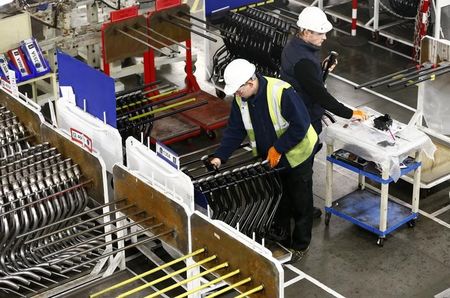By Andy Bruce and Ahmed Aboulenein
LONDON (Reuters) - British manufacturing surged unexpectedly last month as domestic strength helped factories overcome the worst fall in export orders since January 2013, caused by sagging demand from the euro zone.
Monday's Markit/CIPS UK Manufacturing Purchasing Managers' Index (PMI) rose to 53.2 from 51.5 to touch its highest level since July, topping even the most optimistic of forecasts in a Reuters poll and well above the 50 mark denoting expansion.
It stood in stark contrast to the euro zone. While German manufacturing achieved modest growth last month, manufacturing activity in France and Italy -- the second- and third-biggest euro zone economies -- shrank.
Britain still looks on track to outpace other advanced economies this year, but the pace of the recovery has eased slightly over the last few months as European demand fades.
"Solid demand in the U.S. and loose UK financial and monetary conditions, at present, appear to be just about offsetting the impact ... of the weakness of demand in the euro zone," said Dominic Bryant, economist at BNP Paribas.
Consumer and intermediate goods drove the upturn in manufacturing last month, said Markit.
The total new orders index rose from September's 17-month low to its highest level since July.
Sterling rose to its strongest level in a month against the euro following the data, while the premium that British government bonds offer over equivalent German debt hit its highest level in four weeks.
But Bank of England policymakers, who are expected to keep interest rates on hold this week, are likely to note that the PMI new export orders index fell to its lowest level in 21 months.
Minutes from their October policy meeting showed they were already concerned about the risks to Britain from weak euro zone demand.
"Overseas markets have long been viewed as a crucial component ... but this current lack of penetration could hamper the ability of manufacturers to lead the recovery as we move towards 2015," said Mike Rigby, head of manufacturing at Barclays.
PRICE PRESSURES ABSENT
Other details from the survey suggest the BoE will be in no hurry to raise interest rates from their record low levels, with few signs of inflationary pressure.
Factory gate prices rose at the weakest pace in 16 months, reflecting lower raw material costs and stronger competition, and input prices fell for the second month.
Furthermore, Britain's factories hired at a slower rate than in September, with the rate of job creation the second-weakest since June 2013.
"With inflation low and downside risks to growth still significant, if lower than they were a month ago, the BoE faces little pressure to change monetary policy in the near term," said Rob Wood, economist at Berenberg bank.
Three of the BoE's most senior officials have said they are comfortable with interest rates remaining at 0.5 percent for now.
Until a few weeks ago, a small but significant minority of economists expected the BoE would raise interest rates at its November meeting which takes place on Wednesday and Thursday.
Now, they are unanimous in expecting no change this month, according to a Reuters poll. [BOE/INT]

The consensus has become increasingly divided between those who think the BoE will raise rates in the first quarter of next year, and those who say it will wait longer still.
(Editing by Hugh Lawson)
